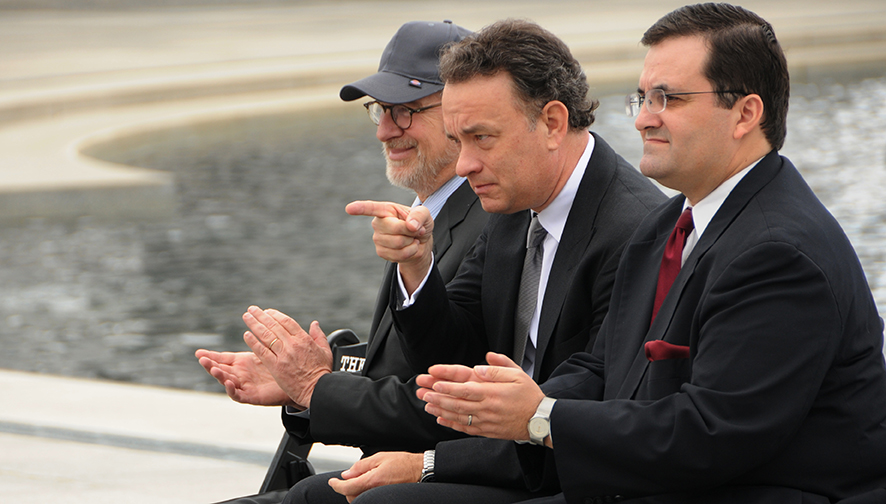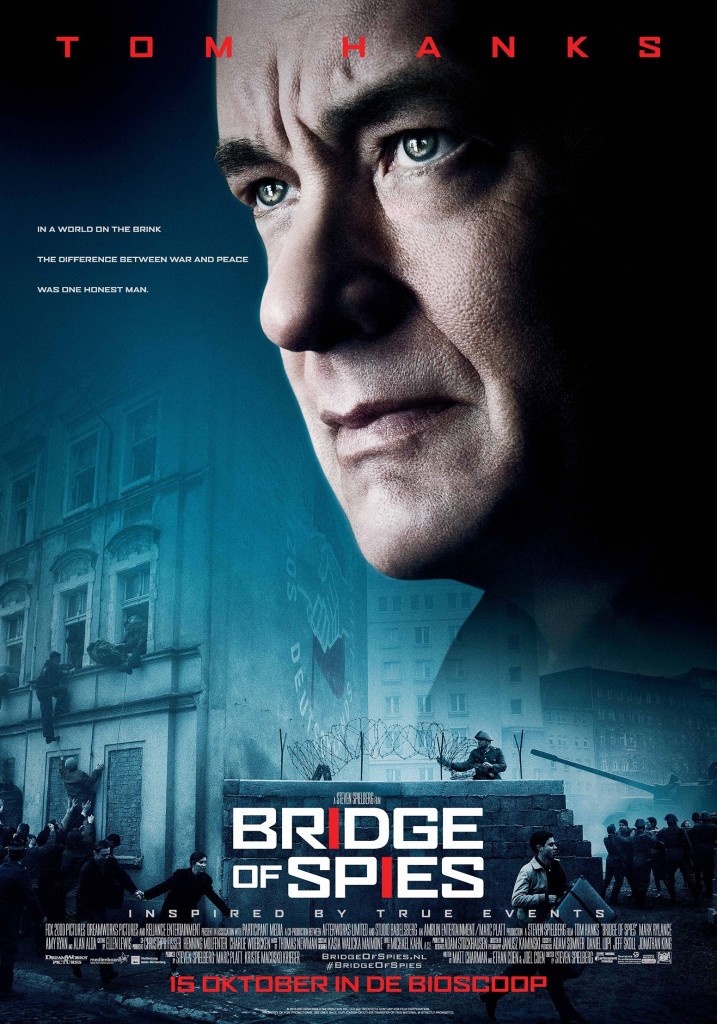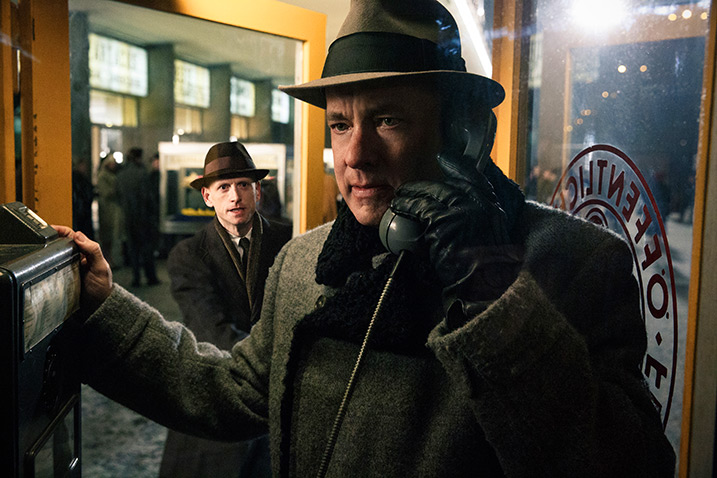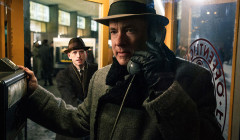Bridge of Spies
When it comes to director/actor collaborations in Hollywood, you can’t get much stronger than Steven Spielberg and Tom Hanks. While Scorsese and DiCaprio may disagree with this notion, it is hard to deny the power that Hanks and Spielberg bring to a production. Regardless of the plot, setting, or budget, if these giants of industry are teaming up, the film instantly bursts forward as a “must see” event. Before their latest project, BRIDGE OF SPIES, the duo had teamed up to create instant classics CATCH ME IF YOU CAN and SAVING PRIVATE RYAN, and had also collaborated to deliver the understate THE TERMINAL.
 Despite these Hollywood heavyweights, BRIDGE OF SPIES somehow remained under the radar for quite some time. Though it was known that the duo were in cahoots once again, the film itself lacked buzz. For these reasons, it was easy for the production to win over their audience in the most natural way possible; by word of mouth.
Despite these Hollywood heavyweights, BRIDGE OF SPIES somehow remained under the radar for quite some time. Though it was known that the duo were in cahoots once again, the film itself lacked buzz. For these reasons, it was easy for the production to win over their audience in the most natural way possible; by word of mouth.
BRIDGE OF SPIES is based on the true story of attorney James Donovan (Hanks), who, in 1957, was tasked with the compromising and dangerous position of defending Soviet spy Rudolf Abel (the excellent Mark Rylance). While Abel’s guilt was fairly apparent, and pre-determined by the majority of American citizens and even the judge presiding over the case, Donovan insists that the Russian deserves a fair trial. Citing his belief in the constitution, the lawyer argues that the very basis of the American justice system is predicated by the notion of “innocent until proven guilty.” Unfortunately, he is alone in his beliefs. Everyone in his life, including his wife Mary (Amy Ryan) and a senior partner at his firm (Alan Alda), believe that he should simply give the impression that he is going through the motions. Due to his unwavering ideals and resolve in regards to due process, Donovan does everything in his power to ensure that his client receives a fair trial.
 As expected, Abel is found guilty, despite a shoddy investigation and major issues with the search warrant that was utilized to collect evidence against the spy. It was a foregone conclusion that these factors didn’t matter, and as expected, Abel was found guilty of his crimes. In a passionate plea, Donovan implores the judge to consider imprisonment over the electric chair. The counselor states that Abel is more useful to them alive than dead. It is his contention that if an American soldier were to be captured by the communists, the spy would serve as an excellent candidate for a prisoner exchange. The judge reluctantly agrees, and Abel is sentenced to 30 years in prison.
As expected, Abel is found guilty, despite a shoddy investigation and major issues with the search warrant that was utilized to collect evidence against the spy. It was a foregone conclusion that these factors didn’t matter, and as expected, Abel was found guilty of his crimes. In a passionate plea, Donovan implores the judge to consider imprisonment over the electric chair. The counselor states that Abel is more useful to them alive than dead. It is his contention that if an American soldier were to be captured by the communists, the spy would serve as an excellent candidate for a prisoner exchange. The judge reluctantly agrees, and Abel is sentenced to 30 years in prison.
Donovan’s premonition came true sooner than he had expected. After a failed attempt at an appeal with the U.S. Supreme Court, Donovan learns that an American soldier had been captured by the Russians. While executing a highly secretive operation, a spy plane flown by pilot Francis Gary Powers (Austin Stowell) is shot down, and though he survived the crash, he became a prisoner. Though he had been instructed to kill himself before being taken by the enemy, Powers couldn’t bring himself to go through with the suicide.
BRIDGE OF SPIES plays out in two enthralling parts. The first half of the film deals directly with the relationship between Donovan and Abel, while the second half follows the lawyer’s attempt to procure a prisoner exchange between the Russians and the Americans. To complicate matters, an American student named Frederic Pryor (Will Rogers) was taken into custody by the East Germans, and Donovan feels that it is his obligation to bring him home as well.
Spielberg’s mastery of cinematic storytelling is on full display in this taut, engaging thriller. The world we live in now may seem vastly different than the one being displayed in the film, but in reality, there are a number of parallels. While the population of the nation wants to see Abel fry for his crimes, Donovan believes that it is our duty as Americans to provide a neutral, legal, and unbiased trial. Despite threats of violence to himself and his family, the lawyer refuses to compromise his beliefs. As a result of his resolve and determination, he builds a respectful relationship with his client that serves as a vital aspect in the attempt to eventually save the captive Americans.
 At this point, it is a foregone conclusion that if Tom Hanks is stepping in front of a camera, he is going to deliver a top-notch performance. In BRIDGE OF SPIES, he does not disappoint. Strong, stoic, passionate, and sympathetic, he is a hero with a fierce, patriotic resolve. As the negotiator for the prisoner release, he navigates dangerous terrain, knowing that if anything goes wrong, there will be no-one to save him. While he is working at the request of the United States, he is not officially affiliated with them in any capacity. His work, whether it is successful or not, will be not be acknowledged by the government. There is a chance that he could be detained, tortured, or executed, and if any of this were to happen, he’d be on his own. This feeling of disquieting unease and danger permeates throughout his entire mission, resulting in a quiet thriller that never relinquishes its grip on the audience.
At this point, it is a foregone conclusion that if Tom Hanks is stepping in front of a camera, he is going to deliver a top-notch performance. In BRIDGE OF SPIES, he does not disappoint. Strong, stoic, passionate, and sympathetic, he is a hero with a fierce, patriotic resolve. As the negotiator for the prisoner release, he navigates dangerous terrain, knowing that if anything goes wrong, there will be no-one to save him. While he is working at the request of the United States, he is not officially affiliated with them in any capacity. His work, whether it is successful or not, will be not be acknowledged by the government. There is a chance that he could be detained, tortured, or executed, and if any of this were to happen, he’d be on his own. This feeling of disquieting unease and danger permeates throughout his entire mission, resulting in a quiet thriller that never relinquishes its grip on the audience.
Spielberg’s film, as they so often do, captures the aesthetics and tension of the era flawlessly. The terse courtroom proceedings, the hasty construction of the Berlin Wall, and harrowing crash suffered at the hands of Powers are all so visceral, that proclaiming that they exude realism is a gross understatement. Even in its quiet moments, the legendary director delivers a product that is endlessly engrossing. BRIDGE OF SPIES may lack the promotional fireworks of some of the more high profile productions of 2015, but is a film whose intangible qualities speak for themselves.
BRIDGE OF SPIES: A
A special thanks goes to Regal Cinemas at Destiny USA for allowing me to attend this month’s film.












